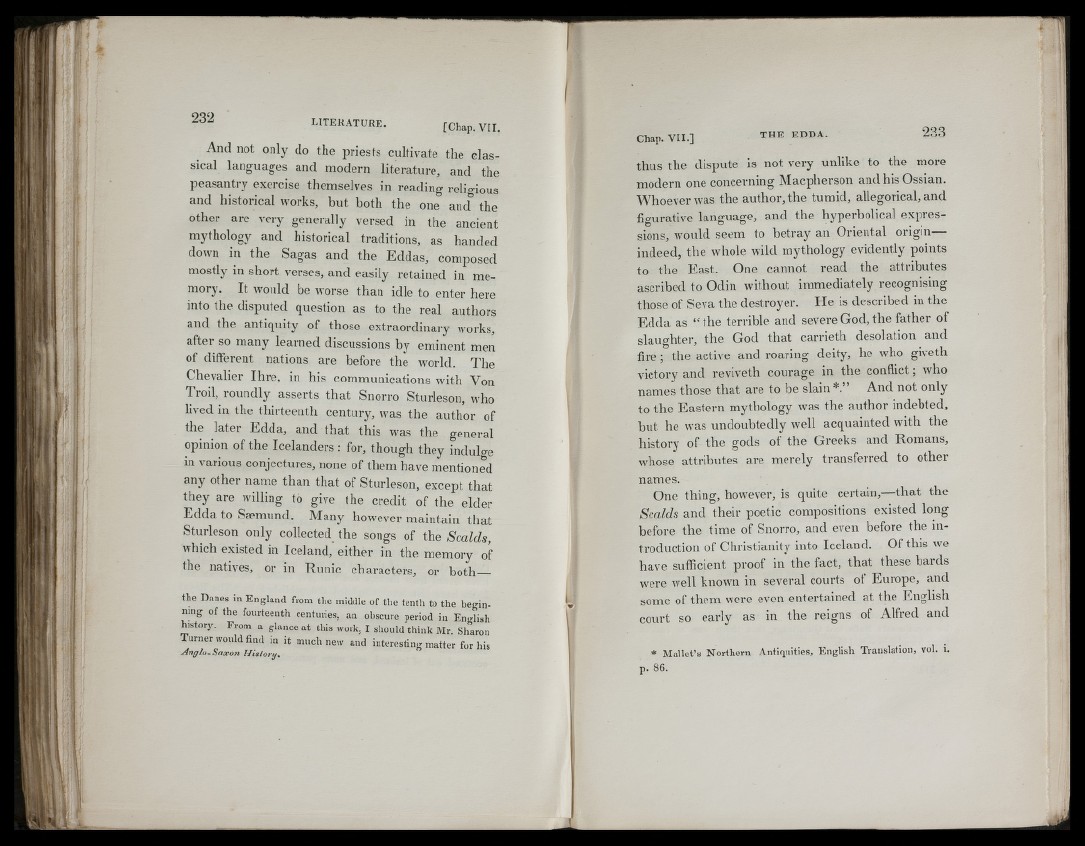
m,
^ And not only do the priests cultivate the classical
languages and modern literature, and the
peasantry exercise themselves in reading religious
and historical Avorks, but both the one and^ the
other are A'ery generally versed in the ancient
mythology and historical traditions, as handed
doAvn in the Sagas and the Eddas, composed
mostly in short verses, and easily retained in memory.
It Avould be AAorse than idle to enter here
into the disputed question as to the real authors
and the antiquity of those extraordinary Avorks,
after so many learned discussions by eminent men
of different nations are before the Avorld. The
Chevalier Ihre, in his communications Avith Von
Troil, roundly asserts that Snorro Sturleson, Avho
lived in the thirteenth century, Avas the author of
the later Edda, and that this was the general
opinion of the Icelanders : for, though they indulge
in various conjectures, none of them have mentioned
any other name than that of Sturleson, except that
they are willing to giA'e the credit of the elder
Edda to Ssemund. Many however maintain that
Sturleson only collected the songs of the Scalds,
which existed in Iceland, either in the memory of
the natives, or in Runic characters, or both__
the Danes in England from the middle of the tenth to the hegin-
nmg o f the fourteenth centuries, an obscure period in En<dish
history. From a glance at this work, I should think Mr. Sharon
Turner would find in it much new and interesting matter for his
Anglu-Saxon Hislorg.
thus the dispute is not very unlike to the more
modern one concerning Macpherson andhis Ossian.
Whoever Avas the author, the tumid, allegorical, and
figurative language, and the hyperbolical expressions,
would seem to betray an Oriental origin
indeed, the Avhole wild mythology evidently points
to the East. One cannot read the attributes
ascribed to Odin without immediately recognising
those of Seva the destroyer. H e is described in the
Edda as “ the terrible and severe God, the father of
slaughter, the God that carrieth desolation and
fir e ; the actiA'e and roaring deity, he Avho giveth
victory and reviveth courage in the conflict; who
names those that are to be slain*.” And not only
to the Eastern mythology was the author indebted,
but he was undoubtedly well acquainted with the
history of the gods of the Greeks and Romans,
whose attributes are merely transferred to other
names.
One thing, howev'er, is quite certain,— that the
Scalds and their poetic compositions existed long
before the time of Snorro, and even before the introduction
of Christianity into Iceland. Of this we
have sufficient proof in the fact, that these bards
were Avell known in several courts of Europe, and
some of them were even entertained at the English
court so early as in the reigns of Alfred and
* Mallet’s Northern Antiquities, English Translation, vol. i.
p . 86.